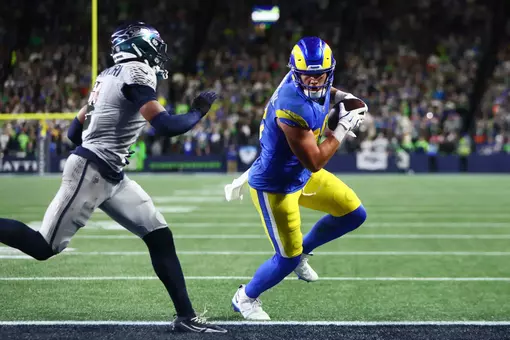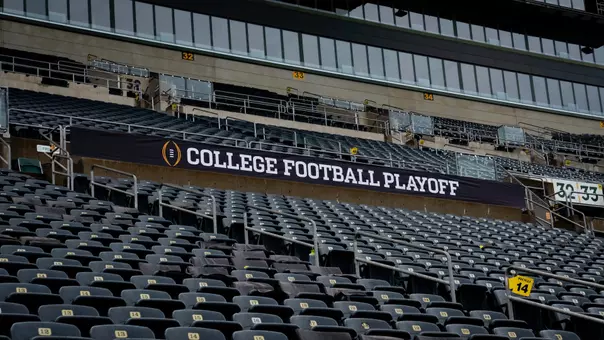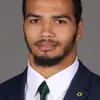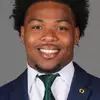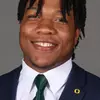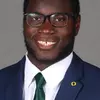
Photo by: @EricEvansPhoto
A Leader Since His Freshman Year, Dye Has UO Football Back On Top
12/30/19 | Football, @GoDucksMoseley
Senior linebacker Troy Dye has been a star player and prominent voice for the Oregon football team since 2016, and he has helped lead the Ducks back from that four-win season.
LOS ANGELES — The pain of defeat still registered on Troy Dye's face when he spoke to media following Oregon's Civil War loss in 2016.
That defeat put an end to Dye's remarkable freshman season with the Ducks, which saw him establish himself as a budding star — a tackling machine whose motor didn't quit. It put an end, too, to the program's streak of 11 straight winning seasons, and to the tenure of the coaching staff that recruited Dye to Eugene.
Having announced his presence to Oregon fans with authority — an 11-tackle performance in his debut against UC Davis that year — Dye became a figurehead off the field as well, unafraid to speak his mind about the state of things in postgame interviews. After the Civil War loss that capped a 4-8 season in 2016, Dye didn't mince words.
"We've gotta all get on the same page and in the same boat, and buy into the process," he said. "Self-accountability is a big thing, and we have to get better on that."
Dye promised to step up and lead the charge.
"We'll be back," he said.

A little over three years later, Dye and the Ducks are preparing to play in the Rose Bowl, against Wisconsin on Wednesday (2 p.m., ESPN). An Oregon team that featured a fractured locker room and a porous defense back then has a rock-solid culture under head coach Mario Cristobal, and a rejuvenated defense coordinated by Andy Avalos and led on the field by Dye.
The Ducks got to Pasadena thanks to the leadership of a senior class that includes quarterback Justin Herbert, three offensive lineman who have started games each of the last four years, and defenders including Drayton Carlberg, Bryson Young and Dye. They've all talked often this season of the way their experience in 2016 molded them, though none as bluntly as Dye.
"I think it build the foundation for the senior class," Dye said. "Without that year, we don't have the passion, the aggression, that we have now. Because, I mean, we were getting our face kicked in for the majority of the season.
"It was just a blood-bath out there — and we weren't the ones doing the killing. We were the ones getting killed. That really kind of set the standard for us, to look back like, OK, we can't do that again."

Oregon's progression up from those depths was methodical. The Ducks won seven games and got back to the postseason in 2017. They won nine times in 2018, including their first bowl victory since 2014. And they enter Wednesday's Rose Bowl with 11 wins, and as Pac-12 champions after beating Utah in the conference title game.
The results have shown steady improvement, but there's also been a constant over the last four years. That's been the impact of Dye, who more than likely will become the first player in program history to lead the Ducks in tackles four straight years.
That kind of impact, from his very first game as a true freshman in 2016, earned Dye the credibility to critique the Ducks during his very first season on campus, and to lead them back to championship status.
"When he talks, people listen," said safety Brady Breeze, a member of Dye's recruiting class who redshirted in 2016 and is now a junior. "Because he does all the work, in the weight room and on the field. And that's just something that we needed."

Becoming a voice of the team, Dye said, wasn't necessarily a role he expected to fill at a program as prominent as Oregon. And when he first got to campus, he said, he was more reserved — yes, he knows how hard that is to believe now — preferring to "stay in the shadows."
Being named Pac-12 player of the week after his first college game thrust Dye into the spotlight. And he met that challenge with the same force with which he meets running backs at the line of scrimmage, and quarterbacks in the backfield.
"It's life, and stuff changes, and things happen," Dye said. "I'm just so fortunate to play this game, and play where I'm at, and I don't take anything for granted. I'm just super blessed."
Becoming a leader didn't diminish Dye's desire to be great. Junior cornerback Thomas Graham Jr. said his position coach, Donte Williams, uses video of Dye hustling in practice as an example of the mentality all the Ducks need to take, every single day.

On the play, running back CJ Verdell burst through a hole in the middle of the line, into the secondary. Dye had blitzed off the edge, and was deep in the backfield moments after the snap. But as Verdell cruised into the end zone, the one defender still in the frame trying to chase him down was Dye.
"Even though CJ already scored, he was still running full-speed all the way to the end zone," Graham said. "It showed how you need to practice."
Dye's motivation to be an impact player helped him play through the pain of a broken thumb in Oregon's win at Washington this season, and through his recovery from the injury in the weeks since. Part of what fueled him was lingering pain from the 2016 season, a scar that hurt more than any injury could.

There was guilt about the jobs lost by coaching staff members. Sadness for the 2016 seniors who saw their careers end in frustrating fashion. And a sense of letting down players who came before.
"All those guys who laid the foundation for us and everybody watching Oregon football play, we let the alumni down, we let the city down, we let the fan base down," Dye said. "And I promised myself we would never do that again."
Consider that promise kept. The Ducks, Dye said in November 2016, would be back. On Wednesday, his prophecy will be fulfilled.
That defeat put an end to Dye's remarkable freshman season with the Ducks, which saw him establish himself as a budding star — a tackling machine whose motor didn't quit. It put an end, too, to the program's streak of 11 straight winning seasons, and to the tenure of the coaching staff that recruited Dye to Eugene.
Having announced his presence to Oregon fans with authority — an 11-tackle performance in his debut against UC Davis that year — Dye became a figurehead off the field as well, unafraid to speak his mind about the state of things in postgame interviews. After the Civil War loss that capped a 4-8 season in 2016, Dye didn't mince words.
"We've gotta all get on the same page and in the same boat, and buy into the process," he said. "Self-accountability is a big thing, and we have to get better on that."
Dye promised to step up and lead the charge.
"We'll be back," he said.

A little over three years later, Dye and the Ducks are preparing to play in the Rose Bowl, against Wisconsin on Wednesday (2 p.m., ESPN). An Oregon team that featured a fractured locker room and a porous defense back then has a rock-solid culture under head coach Mario Cristobal, and a rejuvenated defense coordinated by Andy Avalos and led on the field by Dye.
The Ducks got to Pasadena thanks to the leadership of a senior class that includes quarterback Justin Herbert, three offensive lineman who have started games each of the last four years, and defenders including Drayton Carlberg, Bryson Young and Dye. They've all talked often this season of the way their experience in 2016 molded them, though none as bluntly as Dye.
"I think it build the foundation for the senior class," Dye said. "Without that year, we don't have the passion, the aggression, that we have now. Because, I mean, we were getting our face kicked in for the majority of the season.
"It was just a blood-bath out there — and we weren't the ones doing the killing. We were the ones getting killed. That really kind of set the standard for us, to look back like, OK, we can't do that again."

Oregon's progression up from those depths was methodical. The Ducks won seven games and got back to the postseason in 2017. They won nine times in 2018, including their first bowl victory since 2014. And they enter Wednesday's Rose Bowl with 11 wins, and as Pac-12 champions after beating Utah in the conference title game.
The results have shown steady improvement, but there's also been a constant over the last four years. That's been the impact of Dye, who more than likely will become the first player in program history to lead the Ducks in tackles four straight years.
That kind of impact, from his very first game as a true freshman in 2016, earned Dye the credibility to critique the Ducks during his very first season on campus, and to lead them back to championship status.
"When he talks, people listen," said safety Brady Breeze, a member of Dye's recruiting class who redshirted in 2016 and is now a junior. "Because he does all the work, in the weight room and on the field. And that's just something that we needed."

Becoming a voice of the team, Dye said, wasn't necessarily a role he expected to fill at a program as prominent as Oregon. And when he first got to campus, he said, he was more reserved — yes, he knows how hard that is to believe now — preferring to "stay in the shadows."
Being named Pac-12 player of the week after his first college game thrust Dye into the spotlight. And he met that challenge with the same force with which he meets running backs at the line of scrimmage, and quarterbacks in the backfield.
"It's life, and stuff changes, and things happen," Dye said. "I'm just so fortunate to play this game, and play where I'm at, and I don't take anything for granted. I'm just super blessed."
Becoming a leader didn't diminish Dye's desire to be great. Junior cornerback Thomas Graham Jr. said his position coach, Donte Williams, uses video of Dye hustling in practice as an example of the mentality all the Ducks need to take, every single day.

On the play, running back CJ Verdell burst through a hole in the middle of the line, into the secondary. Dye had blitzed off the edge, and was deep in the backfield moments after the snap. But as Verdell cruised into the end zone, the one defender still in the frame trying to chase him down was Dye.
"Even though CJ already scored, he was still running full-speed all the way to the end zone," Graham said. "It showed how you need to practice."
Dye's motivation to be an impact player helped him play through the pain of a broken thumb in Oregon's win at Washington this season, and through his recovery from the injury in the weeks since. Part of what fueled him was lingering pain from the 2016 season, a scar that hurt more than any injury could.

There was guilt about the jobs lost by coaching staff members. Sadness for the 2016 seniors who saw their careers end in frustrating fashion. And a sense of letting down players who came before.
"All those guys who laid the foundation for us and everybody watching Oregon football play, we let the alumni down, we let the city down, we let the fan base down," Dye said. "And I promised myself we would never do that again."
Consider that promise kept. The Ducks, Dye said in November 2016, would be back. On Wednesday, his prophecy will be fulfilled.
Players Mentioned
Iapani Laloulu | CFP Orange Bowl Preview
Sunday, December 28
Dierre Hill Jr. | CFP Orange Bowl Preview
Sunday, December 28
Emmanuel Pregnon | CFP Orange Bowl Preview
Sunday, December 28
Dante Moore | CFP Orange Bowl Preview
Sunday, December 28


